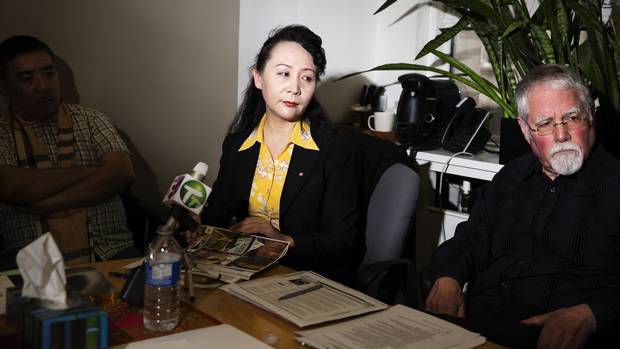
Chinese poet, journalist and activist Sheng Xue conducts reaches out to the media in desperation sharing that she has been accused of being a Chinese spy and that her tormenters are using the internet to destroy her reputation during a press conference in Toronto on Friday, March 4, 2016.
(Michelle Siu/The Globe and Mail)
Even on Canadian soil, critics of China’s human-rights record can face searing personal hostility. It could be the online attacks waged by “50 Cent Army,” the online trolls whom the Chinese government supposedly pay 50 cents of renminbi to insult a writer or subject. In more extreme cases, such as with Miss World Canada Anastasia Lin, secret police will threaten or blackmail family members back home for negative comments made by relatives here.
But the case of Sheng Xue is perhaps the most menacing of them all. One of Canada’s leading democratic-rights advocates, Ms. Sheng, a woman with a regal bearing and sly irony, has long been the target of unusually grotesque attacks.
Her face has been Photoshopped onto lurid escort-service ads that reveal her personal details and then widely distributed. A poison-pen campaign alleged that she embezzled money from the Federation for a Democratic China, the international rights group that she leads. (The FDC investigated and discredited the report.)
In a most surreal twist, a man in a hard hat has recently been standing outside Parliament Hill in inclement weather, carrying a placard alleging Ms. Sheng is a Communist spy.
Ms. Sheng’s ordeal exists in a grey area of free speech where no law seems to apply. While the Mississauga resident is protected by the Charter to express her political opinions, she is vulnerable to forces working in the dark margins who lob allegations with impunity.
“I regret that the foreign-policy establishment in Canada has often been too quick in its willingness to suppress its concerns for these kinds of instances,” said Jason Kenney, the former Conservative immigration minister and current MP who has known Ms. Sheng for 20 years.
“It is hugely important to have courageous and independent voices like Xue’s in the Chinese-Canadian community talking about human rights in China,” he added.
Attacking her reputation, Ms. Sheng’s allies say, is an attempt to silence her in her own country.
“This ordeal is happening to a Canadian citizen within the Canadian borders, and the government has the full responsibility to protect its citizens,” said Michael Craig, chair of China Rights Network, at a news conference held on her behalf Friday.
Attended by a wide range of pro-democracy groups, several participants at the conference pointed out the futility of going to various local police. They have been told there is little the authorities can do.
One of the conference organizers, Rev. Majed el-Shafie, hinted that Ms. Sheng’s allies will send lawyers’ letters to her accusers, ordering them to desist.
Mr. el-Shafie, president of the global justice group One Free World International, said that China’s threats and intimidation don’t bother him. “They can kiss my behind.”
When reached by phone, the Parliament Hill protester, Zhang Xiangyang, said that he swears by his accusations about Ms. Sheng.
A potential lawsuit doesn’t bother him. “I realize this is a serious matter and I am fully responsible for my allegation,” he said, rejecting the notion that he himself may be a paid Chinese provocateur.
When asked to provide references, Mr. Zhang said he didn’t need anyone to speak for him. When asked why he wore a hard hat while on Parliament Hill, he said his life was in danger and that he wore it for protection – and “to show my will, my determination.”
Ms. Sheng said she has been harassed with abusive phone calls since she arrived in Canada after the Tiananmen Square massacre. Since then, she has emerged as a major fixture in the Chinese community, the glue that binds the disparate and fractious elements of its expats: Falun Gong, Uyghurs, Tibetans and Taiwanese. She also distinguished herself as a poet and a journalist, winning a National Magazine Award in 2001 for her work in Maclean’s magazine about Chinese boat refugees.
At times quietly weeping, Ms. Sheng said she has come forward to burnish her own credibility in her community. “If I cannot be strong, they will not trust me.”
In one particularly moving moment, she recalled going to a psychologist for help. The weight of the allegations had become too much to bear for her. When she presented the doctor with the hundreds of pages’ of accusations, he was aghast.
“Oh my God,” she recalled him saying. “This is politics. I can’t help you.”
 English (UK)
English (UK)  中文(简体)
中文(简体)  中文(正體)
中文(正體) 
